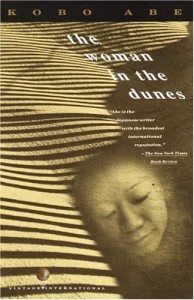Abe, Kobo. (1960-1962/1991). Woman in the Dunes. New York: Vintage.
This novel is considered by many to be Abe’s best, and a prime example of mid-century Japanese fiction. It’s difficult to determine exactly when it was first published, but it does capture the post-WWII existentialism of much philosophy, literature and art. The devastation of the two world wars had proved that history, culture, and human life itself, were all meaningless.
The opening line of the novel cues us that the characters are archetypes and the story a timeless parable. “One day in August, a man disappeared.” The man (called, “the man”), a teacher and amateur entomologist, visits a remote seaside Japanese village to search for rare beetles. The village is built on and among shifting sand dunes, and some of the houses are located in deep pits cut into the dunes. A villager offers the man accommodation in one of these pit houses. He climbs down a rope latter to find a decrepit shack and a thirtyish woman (called simply, “the woman.”) She feeds him and offers a mattress. But in the morning, the ladder is gone.
The rest of this short novel is about the man’s psychological coming to terms with his situation, and with the woman, and the village. He is outraged and makes demands and threats, but nothing happens. He tries unsuccessfully to escape. Each night, the woman must shovel sand into buckets which the villagers above haul up on ropes. If she doesn’t do this, the pit and the house will be buried. Eventually, the man helps her shovel, resentfully at first, then gradually, out of compassion.
He asks why she doesn’t try to escape. She can hardly understand the question. Escape to what? The man is enraged at her stupidity, then his anger turns to pity, and by the end of the novel, understanding. The ending is as bleak as any that can be imagined. The woman is removed for medical treatment and the rope ladder is left hanging down. The man declines to use it.
I see the theme of the novel as a subtle answer to Camus’ essay, The Myth of Sisyphus (1942), which was well known in the educated world in both French and English by the 1950’s. I don’t know if Abe read Camus, or if these existential ideas were merely “in the air” at that time.
Camus argued that life is meaningless and hope is vain. He cites the ancient Greek myth of King Sisyphus, who thought he was smarter than Zeus, and for his hubris, was sentenced to forever push a great boulder up a hill, whereupon, near the top, the boulder would roll to the bottom, requiring Sisyphus to start pushing again. Thus the clever and powerful king was reduced, not to death, which would be too easy, but to an eternity of meaningless, futile effort. As with our lives.
There is also a theme of political oppression in the novel. The man and the woman are exploited by the villagers above who keep them enslaved. The villagers sell the sand they mine to concrete-making companies. In Japan, as in India, there is a so-called “untouchable” class of people who clean sewers, pick garbage, render meat, and so on. In a sense, the woman in the dunes is a member of that caste and seems to accept it as her natural fate. Abe does raise that economical-political dimension in his story, which could be seen as a rebuff to Camus: It is not that death renders life meaningless; rather, it is the economic and political oppression of society’s powerful that render it such. If that is true, it can be changed, unlike Camus’ inexorable Fate. (Abe was a Marxist).
Abe’s is ultimately a story of human salvation, not damnation. The final “missing persons report” notes that the man was gone without a trace for seven years. We are justified in assuming he chose to stay in the village because he found there, for the first time in his life, meaning. That is another refutation of Camus’ thesis that there is no meaning.
Camus also said that one should not cling to illusory hope or comfort because they are false. But that is not quite what Abe says. Tomorrow might hold adventure, curiosity, excitement, a rare beetle, or even love. Death at the end, sure, but until that day, you can find or create meaning. I think that argument gives Camus the knock-out punch. It reduces Sisyphus’s boulder to a grain of sand and finds, at that level of analysis, there is meaning.

